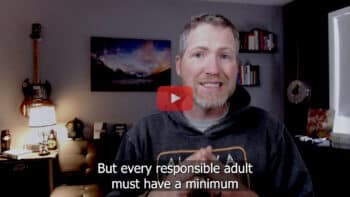
So let’s say today is the day – TEOTWAWKI – now you have some really tough decisions to make, the first of which is “should I stay or should I go?”
To be frank, that decision should have already been made!
Every family should have an emergency plan, and a key component should be answers to this most pertinent of questions.
When asked, most people say something like, “If things get really bad, I’ll go to my parent’s house or my brother’s house,” or something like that…
In many cases, those destinations may be hundreds, if not thousands, of miles away. So what is the smart move?
The plan can’t simply be “go to Dad’s.” That answer doesn’t fit all situations.
Let’s Look At A Few Scenarios:
How about a deadly pandemic – a biological disaster like a super-bug released from a secret military lab (aka a Stephen King scenario)?
Do you take your family out into this? Do you expose them to potentially lethal pathogens?
Most of these pathogens will be carried by people-people just like you will be stuck on a jammed freeway as everyone tries to leave the city.
- How about nuclear terrorism, a nuclear detonation or explosion of a dirty bomb?
- How about a nuclear plant disaster, such as Chornobyl?
Radiation will spread and be lethal for days, weeks, or even months. Winds carry the radioactive debris.
Sure, Atlanta, St Louis, or Kansas City might be a smoking hole in the ground, but how can you tell where that fallout will come down?
You could easily travel right into the path of lethal fallout and not even know it until you start throwing up blood.
- How about political upheaval?
- A democratic government turned police state?
- A full-blown economic collapse with the market wiped out and the dollar worthless?
Anarchy prevails. Perhaps martial law is declared.
Now the lethal threat you may encounter will no longer be microscopic or radioactive. Now the virus in question will be other humans!
Millions are also struggling to survive or taking advantage of those who are.
Still, Want To Go?
If Dad’s house or your brother’s house is an hour or two away, you may be fine – if you’re prepared, you can move quickly and travel the right route.
If this safe house is in Wisconsin and you’re in Florida, you may want to rethink the move. One limiting factor, even if you are willing to risk your safety to make the trip, is the availability of fuel.
Even if fuel is available, what are you going to buy it with?
Dollars May Be Worthless
You now find yourself in a barter economy with everything you own in the car.
You don’t want to get three hundred miles from home, run out of gas and find yourself in a real-world remake of the Road Warrior with the wife and three kids along for the ride.
Stay away from the interstates.
Watch an early episode of The Walking Dead, and you’ll know what I mean.
Plan to travel on back roads, and two-lane state highways, preferably in a vehicle with four-wheel drive capability. Always take the road less traveled if you take any road at all.
It sounds like I’m telling you to stay put, right? Wrong.
In some cases, that will get you just as dead.
Your family plan must have alternatives to fit the potential crisis encountered.
Only having one plan, No Matter The Situation, is destined to fail. You must be flexible. You must have alternatives.
The more “options” you have, the more “resilient” you are!
One Solution Does Not Fit All
You need to decide now when a bug-out is required and when it is not, and then plan for both.
If you consider your hazards, your transportation, fuel, food, and water, route of travel, and level of self-protection, you may be able to negotiate the dangers and arrive at your destination – don’t expect it to be easy.
If you plan to stay put, you need an equally complex plan to survive.
If you decide to go, then make certain you have your bug-out bag ready; every minute matters.
The key is preparation.
Those who wait until TSHTF will wind up in the blades.
“Just In Case” Jack
P.s. One of the best ways I know to develop stay AND go plans is by joining The Resilient Life.
It’s an online coalition of like-minded folks who are working to increase their self-reliance.
As members, you’ll have access to tons of survival challenges, and preparedness badge requirements help motivate and improve your self-reliance. It also tracks your resiliency progress through something called the “Readiness Score.”
Click here right now to learn more.

"Just in Case" Jack
Co-Founder of TheResilientLife.com and SkilledSurvival.com. Creates content, helps members, and is the visionary behind The Resilient Life’s way of living. Husband, father, mechanical engineer, survivalist, and prepper.
See how to find purpose & fulfilment through living a resilient life.
